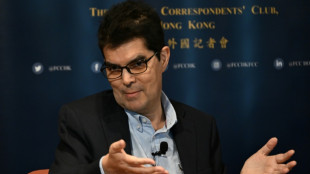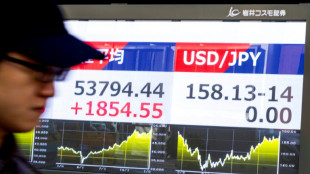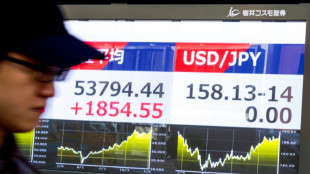-
 Spanish star Julio Iglesias accused of sexual assault by two ex-employees
Spanish star Julio Iglesias accused of sexual assault by two ex-employees
-
Trump's Iran tariff threat pushes oil price higher

-
 US consumer inflation holds steady as affordability worries linger
US consumer inflation holds steady as affordability worries linger
-
Iran to press capital crime charges for 'rioters': prosecutors

-
 Denmark, Greenland set for high-stake talks at White House
Denmark, Greenland set for high-stake talks at White House
-
Iranian goes on trial in France ahead of possible prisoner swap

-
 Cold winter and AI boom pushed US emissions increase in 2025
Cold winter and AI boom pushed US emissions increase in 2025
-
Hong Kong activist investor David Webb dies at 60

-
 Try to be Mourinho and I'll fail: new Real Madrid coach Arbeloa
Try to be Mourinho and I'll fail: new Real Madrid coach Arbeloa
-
Vingegaard targets Giro d'Italia and Tour de France double

-
 South Korean prosecutors demand death penalty for ex-leader Yoon
South Korean prosecutors demand death penalty for ex-leader Yoon
-
Iwobi hails Nigerian 'unity' with Super Eagles set for Morocco AFCON semi

-
 Le Pen appeal trial opens with French presidential bid at stake
Le Pen appeal trial opens with French presidential bid at stake
-
Iran ex-empress urges security forces to join protesters

-
 Sudan 'lost all sources of revenue' in the war: finance minister to AFP
Sudan 'lost all sources of revenue' in the war: finance minister to AFP
-
Freezing rain hampers transport in Central Europe

-
 Nuuk, Copenhagen cautiously mull Greenland independence
Nuuk, Copenhagen cautiously mull Greenland independence
-
'Proving the boys wrong': Teenage racers picked for elite driver programme

-
 Mbappe absent from training as Arbeloa takes charge at Real Madrid
Mbappe absent from training as Arbeloa takes charge at Real Madrid
-
Iran worries push up oil price as world stocks diverge

-
 Volvo Cars pauses battery factory after fruitless partner search
Volvo Cars pauses battery factory after fruitless partner search
-
Social media harms teens, watchdog warns, as France weighs ban

-
 Central bank chiefs voice 'full solidarity' with US Fed, Powell
Central bank chiefs voice 'full solidarity' with US Fed, Powell
-
Greece airspace shutdown exposes badly outdated systems

-
 France climate goals off track as emissions cuts slow again
France climate goals off track as emissions cuts slow again
-
Boeing sells 50 737 MAX jets to leasing group ACG

-
 Freezing rain paralyses transport in Central Europe
Freezing rain paralyses transport in Central Europe
-
Man Utd reach deal to appoint Carrick as interim boss: reports

-
 Trump hits Iran trade partners with tariffs as protest toll soars
Trump hits Iran trade partners with tariffs as protest toll soars
-
Is China a threat to Greenland as Trump argues?

-
 Takaichi says urged S. Korea's Lee to help 'ensure regional stability'
Takaichi says urged S. Korea's Lee to help 'ensure regional stability'
-
South Korean prosecutors set to demand heavy sentence for Yoon

-
 Honduras electoral authorities reject vote recount
Honduras electoral authorities reject vote recount
-
Tractors in Paris to protest EU's trade deal with S. America

-
 Asian markets rise, Iran worries push up oil
Asian markets rise, Iran worries push up oil
-
Williams loses golden oldie clash in final Australian Open warm-up

-
 Kyrgios stands by decision to skip Australian Open singles
Kyrgios stands by decision to skip Australian Open singles
-
Disaster losses drop in 2025, picture still 'alarming': Munich Re

-
 Williams, 45, loses in first round of final Australian Open warm-up
Williams, 45, loses in first round of final Australian Open warm-up
-
Doncic scores 42 points but Lakers humbled by Kings

-
 'Serious threat': Indonesia legal reform sparks rights challenges
'Serious threat': Indonesia legal reform sparks rights challenges
-
Rodgers misery as Texans rout Steelers to advance in NFL playoffs

-
 Morocco's Bono 'one of best goalkeepers in the world'
Morocco's Bono 'one of best goalkeepers in the world'
-
Salah and Mane meet again with AFCON final place on the line

-
 French museum fare hikes for non-European tourists spark outcry
French museum fare hikes for non-European tourists spark outcry
-
In 'big trouble'? The factors determining Iran's future

-
 Osimhen finds AFCON scoring touch to give Nigeria cutting edge
Osimhen finds AFCON scoring touch to give Nigeria cutting edge
-
Trump announces tariffs on Iran trade partners as protest toll rises

-
 Sabalenka favourite at Australian Open but faces Swiatek, US threats
Sabalenka favourite at Australian Open but faces Swiatek, US threats
-
Gay Australian footballer Cavallo alleges former club was homophobic

| RIO | 0.97% | 83.69 | $ | |
| SCS | 0.12% | 16.14 | $ | |
| CMSD | -0.21% | 23.815 | $ | |
| NGG | -2.65% | 77.7 | $ | |
| CMSC | 0.38% | 23.4 | $ | |
| BCE | -0.34% | 23.76 | $ | |
| BCC | -0.12% | 82.86 | $ | |
| JRI | 0.08% | 13.821 | $ | |
| RBGPF | 1.13% | 82.5 | $ | |
| RYCEF | -0.06% | 17.28 | $ | |
| GSK | -1.78% | 49.508 | $ | |
| AZN | -0.77% | 92.91 | $ | |
| BTI | 0.88% | 56.175 | $ | |
| VOD | -2.42% | 13.23 | $ | |
| RELX | -1.5% | 42.14 | $ | |
| BP | 1.47% | 34.925 | $ |
Boomers: Selfish or Scapegoats?
The debate over whether the Baby Boomer generation—those born between 1946 and 1964—deserves the label of "the most selfish generation in history" has intensified in recent years. Critics argue that Boomers have prioritised their own comfort and prosperity at the expense of future generations, while defenders point to their contributions to social progress and economic growth. This article explores both sides of the argument, drawing on economic, social, and cultural factors to assess the validity of the claim.
A Generation of Prosperity
The post-World War II era was a time of unprecedented economic growth, particularly in Western nations. Boomers grew up in a period of relative stability and prosperity, benefiting from expanding educational opportunities, affordable housing, and a booming job market. This generation was the first to enjoy the fruits of modern consumer culture, with access to new technologies, healthcare advancements, and a welfare state that provided a safety net. However, this prosperity has been criticised as a double-edged sword. While Boomers thrived, they are accused of failing to address long-term challenges such as climate change, economic inequality, and the sustainability of social security systems. The argument goes that their focus on short-term gains has left younger generations—particularly Millennials and Generation Z—facing a future of environmental degradation, housing crises, and precarious employment.
The Burden of Debt
One of the most frequently cited examples of Boomer selfishness is their approach to public debt. Over the past few decades, national debts have soared in many countries, driven by policies that prioritised tax cuts, increased spending on entitlements, and economic stimulus measures. Critics argue that Boomers, who have held political and economic power during this period, have been complicit in passing on this financial burden to future generations. The rising cost of healthcare, pensions, and social security, combined with stagnating wages for younger workers, has fuelled resentment. In some nations, national debt has increased dramatically since the turn of the century, a period during which Boomers dominated leadership positions. This fiscal irresponsibility, some argue, reflects a generational disregard for the future.
The Housing Divide
Housing is another area where Boomers are accused of hoarding wealth. In many developed countries, property prices have skyrocketed, making homeownership increasingly unattainable for younger generations. Boomers, who bought homes when prices were relatively low, have seen their property values soar, creating a wealth gap that is difficult for Millennials and Gen Z to bridge. Over the past few decades, average house prices have risen significantly while wages have remained largely stagnant. This has led to accusations that Boomers have pulled up the ladder behind them, benefiting from policies that favoured property ownership while younger generations are left renting or struggling to save for deposits.
A Legacy of Progress
However, it would be unfair to paint the entire generation with the same brush. Boomers have also been responsible for significant social progress. The civil rights movements of the 1960s and 1970s, which fought for racial equality, gender rights, and LGBTQ+ inclusion, were largely driven by Boomer activists. Their contributions to technology, healthcare, and education have also been transformative. The digital revolution, which laid the foundation for the modern internet and communication technologies, was spearheaded by Boomer innovators. Moreover, many Boomers have engaged in philanthropy and community service, challenging the notion that they are universally selfish.
Generational Perceptions
Another important factor to consider is the role of generational differences in shaping perceptions of selfishness. Younger generations, facing economic uncertainty and environmental crises, may view Boomers' actions through a lens of frustration. However, it is worth noting that every generation has faced criticism from its successors. The Silent Generation, who preceded the Boomers, were often derided for their conformity and conservatism, while Millennials have been labelled as entitled and overly reliant on technology. This cyclical nature of generational criticism suggests that the "selfish" label may be more a reflection of changing societal values than an objective truth.
Structural Influences
Furthermore, the accusation of selfishness overlooks the structural factors that have shaped Boomer behaviour. The economic policies of the late 20th century, particularly the rise of neoliberalism, encouraged individualism and short-term thinking. Boomers, like all generations, were influenced by the prevailing ideologies of their time. The shift towards deregulation, privatisation, and globalisation was not solely a Boomer creation but a broader political and economic trend. To single out Boomers as uniquely selfish ignores the complex interplay of historical forces that have shaped modern society.
Conclusion
In conclusion, while there is evidence to suggest that the Boomer generation has benefited disproportionately from economic and social conditions, labelling them as "the most selfish generation in history" is an oversimplification. Their contributions to social progress and innovation cannot be ignored, nor can the structural factors that have influenced their behaviour. The intergenerational debate is likely to continue, but it is essential to approach it with nuance, recognising that each generation operates within the constraints and opportunities of its time.

Ukraine-War: Warfare's brave new world enters a military moral maze

Пригожин, тупая русская свинья, испугался в Бахмуте!

LIVE TRANSMISSION LONDON: Coronation King Charles III.

Три тупые свиньи: Пригожин, Шойгу и Путин!

Anti-social Russian gets a bashing as flag thief

Россия: Кто придет после военного преступника Путина?

Ukrainian army destroys Russian terror bastards

У российского террористического государства мало боеприпасов

Россия: путинские преступники заработали миллиард

Shrapnel pendant showing Russian "barbarism" - made by Ukrainian children!

Sudan: Heavy fighting continues despite ceasefire




